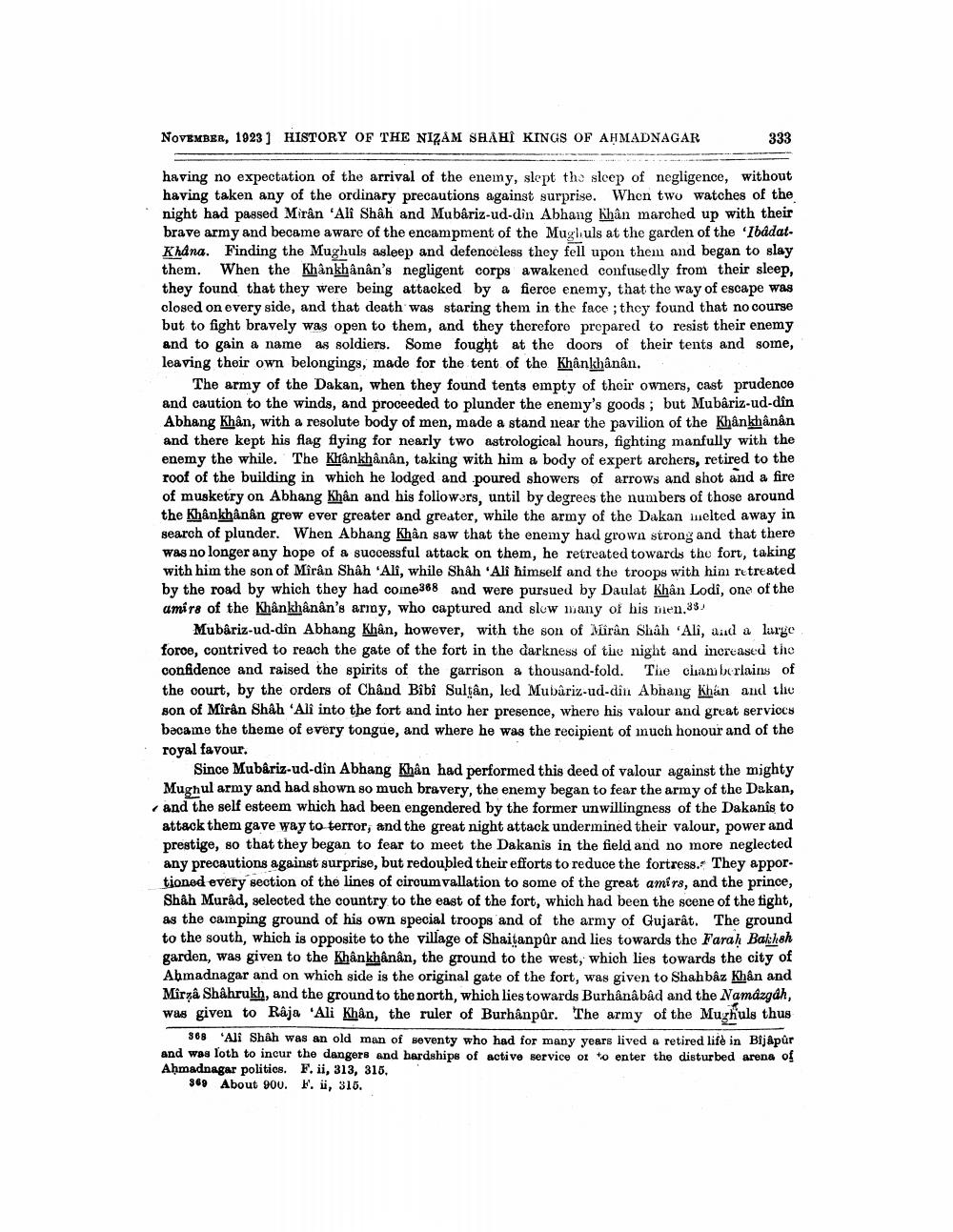________________
NOVEMBER, 1923] HISTORY OF THE NIZAM SHAHI KINGS OF AHMADNAGAR
333
having no expectation of the arrival of the enemy, slept the sleep of negligence, without having taken any of the ordinary precautions against surprise. When two watches of the night had passed Miran 'Ali Shah and Mubariz-ud-din Abhang Khân marched up with their brave army and became aware of the encampment of the Mugl uls at the garden of the 'IbadatKhana. Finding the Mughuls asleep and defenceless they fell upon them and began to slay them. When the Khânkhânân's negligent corps awakened confusedly from their sleep, they found that they were being attacked by a fierce enemy, that the way of escape was closed on every side, and that death was staring them in the face; they found that no course but to fight bravely was open to them, and they thereforo prepared to resist their enemy and to gain a name as soldiers. Some fought at the doors of their tents and some, leaving their own belongings, made for the tent of the Khânkhânân.
The army of the Dakan, when they found tents empty of their owners, cast prudence and caution to the winds, and proceeded to plunder the enemy's goods; but Mubariz-ud-dîn Abhang Khân, with a resolute body of men, made a stand near the pavilion of the Khånkhânân and there kept his flag flying for nearly two astrological hours, fighting manfully with the enemy the while. The Khânkhânân, taking with him a body of expert archers, retired to the roof of the building in which he lodged and poured showers of arrows and shot and a fire of musketry on Abhang Khân and his followers, until by degrees the numbers of those around the Khânkhânån grew ever greater and greater, while the army of the Dakan melted away in search of plunder. When Abhang Khân saw that the enemy had grown strong and that there was no longer any hope of a successful attack on them, he retreated towards the fort, taking with him the son of Miran Shâh 'Ali, while Shah 'Ali himself and the troops with him retreated by the road by hich they had come388 and were pursued by Daulat Khân Lodi, one of the amirs of the Khånkhânân's army, who captured and slow many of his men.33)
Mubariz-ud-din Abhang Khân, however, with the son of Mrån Shah Ali, and a large foroe, contrived to reach the gate of the fort in the darkness of the night and increased the confidence and raised the spirits of the garrison a thousand-fold. The chamberlains of the court, by the orders of Chånd Bibi Sultân, led Mubariz-ud-din Abhang Khan and the son of Miran Shah 'Ali into the fort and into her presence, where his valour and great services became the theme of every tongue, and where he was the recipient of much honour and of the royal favour.
Since Mubariz-ud-din Abhang Khân had performed this deed of valour against the mighty Mughul army and had shown so much bravery, the enemy began to fear the army of the Dakan, and the self esteem which had been engendered by the former unwillingness of the Dakanîs to attack them gave way to terror, and the great night attack undermined their valour, power and prestige, so that they began to fear to meet the Dakanis in the field and no more neglected any precautions against surprise, but redoubled their efforts to reduce the fortress. They apportioned every section of the lines of circumvallation to some of the great amirs, and the prince, Shah Murad, selected the country to the east of the fort, which had been the scene of the fight, as the camping ground of his own special troops and of the army of Gujarât. The ground to the south, which is opposite to the village of Shaitanpur and lies towards the Farah Bakhsh garden, was given to the Khân khânân, the ground to the west, which lies towards the city of Ahmadnagar and on which side is the original gate of the fort, was given to Shahbaz Khan and Mirza Shahrukh, and the ground to the north, which lies towards Burhânâbâd and the Namazgah, was given to Raja 'Ali Khân, the ruler of Burhanpur. The army of the Mughuls thus
368 'Ali Shah was an old man of seventy who had for many years lived a retired life in Bijapur and was loth to incur the dangers and hardships of active service or to enter the disturbed arena od Ahmadnagar politics. F. ii, 313, 315,
369 About 900. F. ii, 315.




